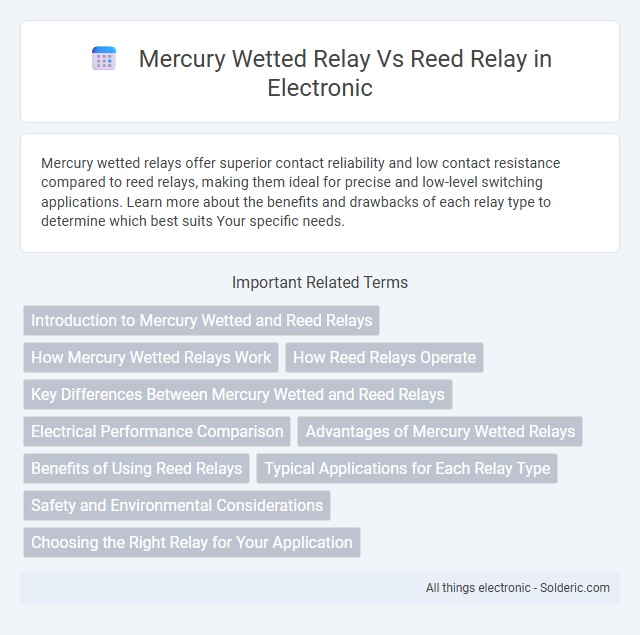Mercury wetted relays offer superior contact reliability and low contact resistance compared to reed relays, making them ideal for precise and low-level switching applications. Learn more about the benefits and drawbacks of each relay type to determine which best suits Your specific needs.
Comparison Table
| Feature | Mercury Wetted Relay | Reed Relay |
|---|---|---|
| Contact Material | Mercury (liquid metal) | Ferromagnetic reeds |
| Contact Resistance | Very low (~10 milliohms) | Low to moderate (30-200 milliohms) |
| Switching Speed | Fast (few milliseconds) | Fast (1-3 milliseconds) |
| Lifespan | Long (10^7 to 10^8 cycles) | Moderate (10^6 to 10^8 cycles) |
| Environmental Impact | Contains toxic mercury | Environmentally safe |
| Size | Typically larger | Compact and lightweight |
| Applications | High-reliability switching, precision measurements | General-purpose switching, signal routing |
| Operating Voltage | Up to several hundred volts | Typically up to 200 V |
| Switching Capacity | Up to a few amps | Typically up to 1-2 amps |
Introduction to Mercury Wetted and Reed Relays
Mercury wetted relays utilize a liquid mercury contact to ensure low contact resistance and high reliability in switching low-level signals, making them ideal for sensitive electronic applications. Reed relays employ ferromagnetic reed switches sealed within a glass tube, offering fast switching speeds and durability in compact designs. Both relay types provide precise switching capabilities, with mercury wetted relays excelling in stable contact resistance and reed relays favored for their simplicity and size.
How Mercury Wetted Relays Work
Mercury wetted relays operate by using a small amount of liquid mercury to create a low-resistance contact that minimizes contact bounce and ensures reliable switching, especially in low-level signal and high-speed applications. The mercury wets the electrical contacts, resulting in consistent electrical conductivity and reducing oxidation or contamination effects often seen in traditional reed relays. Your choice of relay impacts the precision and longevity of switching performance in sensitive electronic circuits.
How Reed Relays Operate
Reed relays operate by using an electromagnetic coil to generate a magnetic field that closes or opens ferromagnetic reed contacts encased within a sealed glass envelope, ensuring reliable switching with minimal contact bounce. The reed contacts are made from magnetic metal alloys, allowing them to respond quickly to the magnetic field, which results in low power consumption and fast switching speeds suitable for signal-level applications. Unlike mercury wetted relays, reed relays do not rely on a liquid metal, making them more environmentally friendly but potentially less suited for extremely low contact resistance and high durability in harsh environments.
Key Differences Between Mercury Wetted and Reed Relays
Mercury wetted relays use a droplet of mercury to ensure low contact resistance and minimal contact bounce, providing higher reliability and longer lifespan under high-frequency switching conditions. Reed relays operate with two ferromagnetic reeds sealed in a glass envelope, offering faster switching speeds and lower power consumption but with higher contact resistance and increased susceptibility to contact wear. Key differences include mercury wetted relays' superior contact stability and longevity in harsh environments versus reed relays' compact size and suitability for low-voltage, low-current applications.
Electrical Performance Comparison
Mercury wetted relays exhibit superior electrical performance with lower contact resistance and higher reliability under high current and voltage conditions compared to reed relays. Reed relays offer faster switching speeds but tend to suffer from contact bounce and higher resistance due to their metallic contacts. Your application benefits from choosing mercury wetted relays when consistent low resistance and long contact life are critical for precise electrical performance.
Advantages of Mercury Wetted Relays
Mercury wetted relays offer superior contact reliability due to their liquid mercury contacts, which provide consistent conductivity and minimize contact resistance and chatter. These relays excel in high-speed switching applications and harsh environments by resisting corrosion and oxidation, ensuring longer operational life compared to reed relays. Your systems benefit from improved signal integrity and durability when choosing mercury wetted relays over traditional reed relay options.
Benefits of Using Reed Relays
Reed relays offer several benefits over mercury wetted relays, including their mercury-free design which eliminates environmental and health concerns. They provide faster switching speeds and better durability in low-power and high-frequency applications, ensuring reliable performance in sensitive circuits. Choosing a reed relay enhances your system's safety and compliance with modern environmental regulations.
Typical Applications for Each Relay Type
Mercury wetted relays are typically used in precision measurement instruments, medical devices, and aerospace applications where low contact resistance and high reliability are critical. Reed relays find common applications in telecommunications, test equipment, and automated test systems due to their fast switching speed and ability to handle low-level signals. Your choice depends on whether you prioritize the rugged, stable contacts of mercury wetted relays or the compact, quick action of reed relays in your specific application.
Safety and Environmental Considerations
Mercury wetted relays contain liquid mercury, raising concerns about toxicity and environmental hazards due to mercury's bioaccumulative properties and strict disposal regulations. Reed relays use sealed glass envelopes with inert gas, eliminating mercury-related risks and offering a safer, more environmentally friendly option. Compliance with RoHS and REACH directives favors reed relays to reduce hazardous substances in electronic components.
Choosing the Right Relay for Your Application
Choosing the right relay for your application depends on factors such as contact reliability, switching speed, and environmental conditions. Mercury wetted relays offer low contact resistance and high reliability for sensitive signal switching but contain toxic mercury, requiring careful handling and disposal. Reed relays provide fast switching and long life without hazardous materials, making them suitable for general-purpose applications where safety and environmental concerns are priorities.
Mercury Wetted Relay vs Reed Relay Infographic

 solderic.com
solderic.com